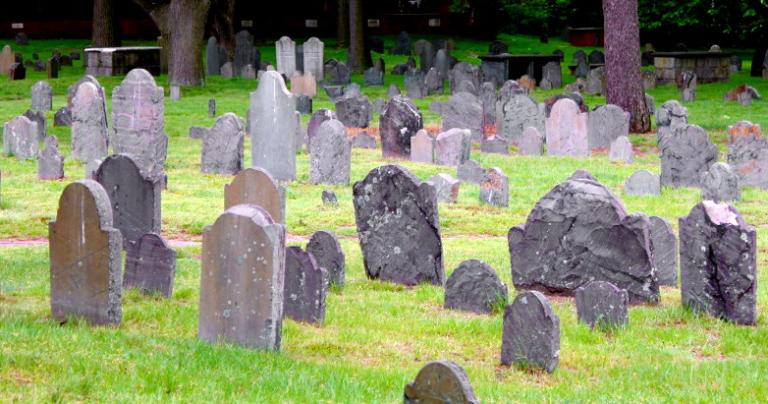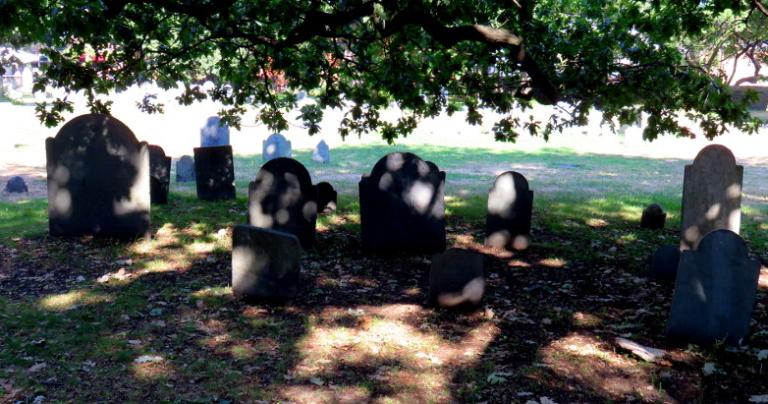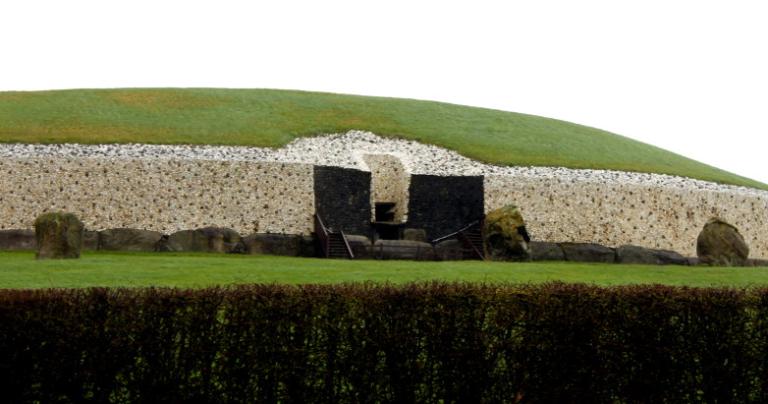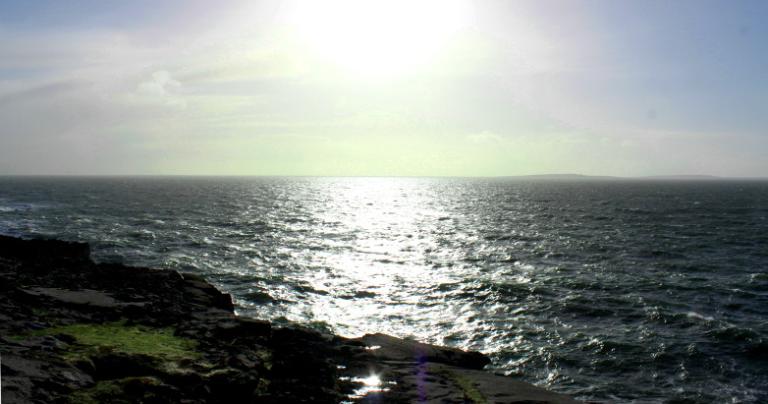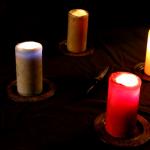My first response to the Las Vegas massacre was “Pray for the dead. The living won’t listen.” It was an expression of frustration at yet another mass shooting in a country that accepts them as inevitable. It was also a genuine concern for the 58 people who died a sudden and violent death.
Some traditions teach that your state of mind at death determines (or at least, strongly influences) your position in the afterlife and in the next life – or if you even get to the afterlife. Some of the most famous ghosts are connected to people who died tragically. Whether those ghosts are earthbound spirits or simply “energetic remains” is another question for another time (my best guess: sometimes it’s one, sometimes it’s the other).
In any case, dying in pain, fear, and anger is hardly conducive to peacefully moving on to whatever comes next. The dead deserve our prayers and offerings for a smooth transition.
When I was growing up in a fundamentalist church, I was taught that prayers for the dead were useless – “it’s too late to pray for them.” According to fundamentalist doctrine, the dead were immediately either in heaven or in hell and nothing could be done to change their fate.
I do my best to avoid critiquing the doctrines of other religions. We have different foundational assumptions, different values, and different ways of interacting with the world. We have no common ground to debate the nature of the afterlife or the status of those who have died. But because of the prominence of Protestant Christianity in the United States, the idea that prayers for the dead are useless is widespread in our mainstream culture.
This is blasphemy.
The Blasphemy of “It’s Too Late”
Blasphemy: “the act or offense of speaking sacrilegiously about God or sacred things.”
Most of my complaints against fundamentalism deal with facts: the Bible is not the inerrant Word of God, the Earth is far more than 6000 years old, and apocalyptic prophecies have a 3500-year track record of being wrong every single time.
Some of my complaints deal with outcomes: teaching small children that failing to follow your religion will send them into eternal torment can cause anxiety to a degree that can properly be classified as child abuse.
Blasphemy is a religious charge, not a factual one. It is a charge that is ripe for exploitation (as with the fundamentalist Muslim governments who occasionally imprison people for blasphemy against Islam) and therefore should never carry a secular penalty. Yet it remains in our vocabulary because some things are so sacred that to profane them demands a response.
Few things are as sacred as the dead, though they are not things but persons. Saying “it’s too late” abandons them to deal with being dead on their own, needlessly severing a relationship that death has altered but has not ended.
We must do better for the dead.
Christian opposition to this blasphemy
I’m a Pagan and a polytheist who writes from a Pagan and polytheist viewpoint. But given the prevalence of Christianity in this society, it is necessary to point out that those who believe prayers for the dead are ineffective are hardly representative of all of Christendom.
The Catholic Church has a long tradition of purgatory, an intermediate state from which one can eventually reach heaven. Prayers by the living on behalf of the dead help expedite that transition. The Eastern Orthodox position is less well defined, but in general teaches that those “departed even with the slightest virtue” can be redeemed after death. Anglicans and most other Protestants generally reject the idea of purgatory, but many believe the dead will eventually be reconciled to God and thus prayers for them are beneficial.
Even some Evangelicals are moving away from the idea of hell, most notably Rob Bell. Bell’s 2011 book Love Wins offered more questions than answers (and got Bell effectively excommunicated from many Evangelical churches and organizations), but made it clear that while evil-doers will not go directly to heaven, they will get there eventually. And if they can get there eventually, then it is good to pray for them.
Christian Universalists such as John Murray (a direct ancestor of my own Unitarian Universalism) taught the same thing 200 years earlier.
As a Pagan I have no interest in debating the details of these beliefs and doctrines. I list them to make it clear that those who preach “it’s too late” are of a minority opinion in their own religion.
Another blasphemy: “funerals are for the living”
Yes, funerals are a necessity for the living. They’re a rite of passage that allow people to process their grief and collectively understand that the deceased is no longer with them. The relationship has shifted from one of family member or friend to one of ancestor or beloved dead. Funerals tell the survivors that they’ve done what needed to be done for the dead and now it’s OK for regular life to resume.
Except many funerals do not do what needs to be done for the dead. The good ones celebrate the life of the recently deceased. The bad ones serve as an excuse for preaching threats of hellfire to the grieving and vulnerable. Precious few actually address the needs of the dead.
Many traditions teach that the dead do not immediately move on to the Otherworld, but hang around for a few days or weeks instead. Some have to figure out they’re dead (think Bruce Willis in The Sixth Sense). Some are reluctant to leave their loved ones. Some have unfinished business, particularly those who died sudden and violent deaths.
Good funerals tell the dead “we loved you, we still love you, we will miss you, but we will be OK.” They say “it’s OK to move on.” They call the person’s ancestors and deities to serve as psychopomps to assist them in the crossing. Though I would quibble with some of the details, this “farewell” from the funeral rite by The Druid Network is a good basic example:
So I call to the guide and guardian of the dead, you who ride the night with the wild hunt, gathering the souls of the departed, leading them along the hidden ways to Annwn, the place of no place, where they will rest after the struggles of this life, nourished and healed for their journey of rebirth.
Guide well the soul of (deceased) on that journey of the setting sun, through the darkness of night to the place of peace.
May those who have gone before prepare a joyous welcome among their company in that blessed land, far beyond the shores of this world. May understanding grow there with the stories told, may nourishment be found in the food of angels, with remembrance of love and the soul’s release into perfect freedom. So may it be.
Some cultures and traditions have specific requirements, such as preparing the body in a certain way or giving the dead coins to pay the ferryman. Our species has always buried our dead with grave goods – it is likely that other human species did so as well. Our most ancient ancestors were not that different from us – they would not have buried perfectly good tools, jewelry, and other items unless they thought it was necessary.
The world’s many funeral customs are far beyond the scope of this post – research the requirements of your tradition before you need to conduct a funeral. But whatever your tradition, there are things the living must do for the dead.
Pray for the dead
It is your responsibility to pray for your dead. Your prayers help your family member or other loved one to begin the process of transitioning from “recently deceased” to “beloved ancestor.” They have their hands full dealing with their new circumstances – the sooner they move on, the sooner they can become an ancestral ally who can help you here and now.
Failure to help the dead move on can have consequences for the living beyond the stereotypical hauntings and such. A few years ago I came across someone stuck living painfully in this world years after their time, because the long-dead ancestor who needed to help them cross was stuck themselves. That story is not mine to tell, except to say that after proper rites were performed all quickly became as it should be.
And that brings us back to the 58 victims of the Las Vegas massacre. Here’s a list of everyone who died, including photos and brief biographies. It is reasonable to assume their families will hold funerals for all of them. It is also reasonable to assume that many if not most of those funerals will be spiritually weak. Some of the dead, no doubt, are strong enough and close enough to their Gods and ancestors to make the crossing anyway, despite their traumatic deaths.
But almost certainly, some are not.
Will you pray for these dead?
Statistically speaking, most of these people were Christians, of one variety or another. A few were atheists. Some never gave religion much thought. Probably one or two followed a religion you wouldn’t expect to find at a country music concert.
Keep your prayers respectful of their traditions – do not ask the Morrigan to fetch the soul of someone expecting to see Jesus. Respect their families – say these prayers privately.
Call their names. Wish them peace and healing. Ask their ancestors to guide them. Ask their God or Gods, whoever They may be, to receive them.
If you cannot pray for all of them, then pray for some of them. Or pray for one of them.
Praying for the dead is sacred work. Abandoning the dead is blasphemy.


